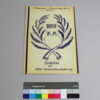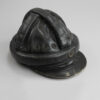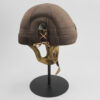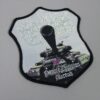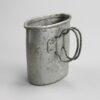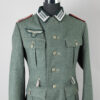Membership stamp of the League of Jewish Frontline Soldiers, ca. 1920s
Inventory number: DPM 6.2171
The permission to perform military service was perceived by many German Jews as a building block towards their equality. Around 96,000 Jewish soldiers fought in the First World War, but they were confronted with anti-Semitic discrimination. In 1916, the War Ministry even ordered a “Jewish census” – ostensibly to investigate accusations from the population that Jews were shirking military service. This census was perceived as an affront, particularly by patriotic Jews.
Some Jews and people of Jewish descent also took part in the 1918 revolution. However, the majority of Jewish citizens tended to be liberal to conservative, and some also served in the Freikorps. Nevertheless, the right now also linked the enemy image of the “Jew” with that of the revolutionary and, above all, the scapegoat for the defeat in the war, which became the “stab-in-the-back legend”. This had concrete consequences: Although the constitution of the Weimar Republic guaranteed equal rights for Jews, the anti-Semitism of German society erupted in violence against the Jewish section of the population. National Socialist parties also achieved their first political successes during this period.
The Reichsbund jüdischer Frontsoldaten (RjF) was founded at the beginning of 1919 and had 30,000 to 40,000 members at the time of its existence. It represented the interests of Jewish soldiers, but also protected Jewish institutions from anti-Semitic attacks. The federation countered the smear campaigns with educational work and publications that compiled the achievements of Jewish soldiers in the First World War. The RjF was organized like an association. Its members paid a membership fee and received stamps in return, which they stuck in their membership booklet as proof of membership.
As the economic situation calmed down and the political situation stabilized, anti-Semitic attacks also declined until they became state doctrine when the NSDAP came to power in 1933. While Jewish World War II veterans, like the rest of the Jewish population, were subjected to massive repression and excesses of violence, those who fought at the front initially enjoyed certain advantages. For example, they were exempt from the “Aryan paragraph” of the new law on professional civil servants and received awards and higher social benefits together with other German World War II veterans.
Only a very small number of Jewish soldiers had served in the Reichswehr. The Military Service Act of March 1935 excluded Jews from serving in the armed forces. This was a deliberate disparagement, as military service, whether as a conscript or as a soldier serving for a longer period, was seen as an honorary service to which only full citizens were entitled. The Reichsbund jüdischer Frontsoldaten (Reich Association of Jewish Frontline Soldiers) wrote letters requesting that Jews be allowed to serve in the Wehrmacht and published a slogan to its members at the end of May: times would improve again. With the “Nuremberg Laws” of September 15, 1935, the RjF finally realized its blatant miscalculation and supported the emigration of Jews from Germany. From August 1936, the government banned Reichsbund activities that went beyond caring for Jewish war victims. After the Reichspogromnacht on November 9-10, 1938, it was forced to end its work and disbanded. Its members, who were unable to flee in time, were persecuted, deported and murdered like the other Jews under German rule.
In 2006, soldiers of the Bundeswehr founded the Bund jüdischer Soldaten e.V. as the successor organization to the Reichsbund.
Object of the month
(short) stories from the depot
Unfortunately, many objects cannot currently be shown in the exhibition for conservation reasons. Here you will find unusual objects and exciting stories of special pieces from the depot





